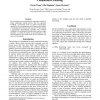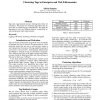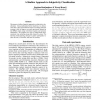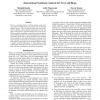131
Voted
ICWSM
2008
15 years 3 months ago
2008
Given the rapid growth of participatory media content such as blogs, there is a need to design personalized recommender systems to recommend only useful content to users. We belie...
127
click to vote
ICWSM
2008
15 years 3 months ago
2008
In this paper, we present a series of semantic analyses of words in political blogs in the setting of categorization of two opposite political orientations: liberal vs. conservati...
107
click to vote
ICWSM
2008
15 years 3 months ago
2008
We investigate two recommendation approaches suitable for online multimedia sharing services. Our first approach, UserRank, recommends items by global interestingness irrespective...
122
click to vote
ICWSM
2008
15 years 3 months ago
2008
This paper focuses on analyzing (Japanese) splogs based on various characteristics of keywords contained in them. We estimate the behavior of spammers when creating splogs from ot...
103
click to vote
ICWSM
2008
15 years 3 months ago
2008
Tags lack organizational structure limiting their utility for navigation. We present two clustering algorithms that improve this by organizing tags automatically. We apply the alg...
109
click to vote
ICWSM
2008
15 years 3 months ago
2008
We present a shallow linguistic approach to subjectivity classification. Using multinomial kernel machines, we demonstrate that a data representation based on counting character n...
103
click to vote
ICWSM
2008
15 years 3 months ago
2008
With the popularity of social networks such as Facebook, we have greatly extended our social interactions from the physical into the digital. With social networks we have an incre...
125
click to vote
ICWSM
2008
15 years 3 months ago
2008
There is a growing interest in mining opinions using sentiment analysis methods from sources such as news, blogs and product reviews. Most of these methods have been developed for...
119
click to vote
ICWSM
2008
15 years 3 months ago
2008
While previous studies have used the Wikipedia dataset to provide an understanding of its growth, there have been few attempts to quantitatively analyze the establishment and evol...
124
click to vote
ICWSM
2008
15 years 3 months ago
2008
Blog links raise three key questions: Why did the author make the link, what exactly is he pointing at, and what does he feel about it? In response to these questions we introduce...





